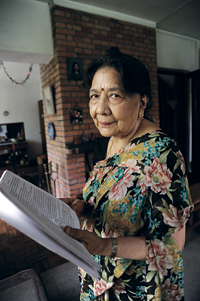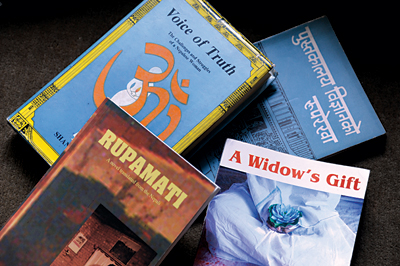A woman who expelled at many roles, Shanti Mishra’s accomplishments have made it easier for women today to take up unconventional roles.
 Wearing a simple sari, Shanti Mishra’s eyes sparkle with a genuine happiness and kindness as she welcomes me into her home with open arms. However, although her clothes may be ordinary, at age 77, Shanti Mishra is by no means an ordinary woman.
Wearing a simple sari, Shanti Mishra’s eyes sparkle with a genuine happiness and kindness as she welcomes me into her home with open arms. However, although her clothes may be ordinary, at age 77, Shanti Mishra is by no means an ordinary woman.
Shanti Mishra is, truly, a woman of wisdom and words. She has broken free of all the traditional clutches of our somewhat male-dominated society and has always progressed forward, reaching heights that no other Nepali woman of her time has. With a Masters in History from the University of Calcutta as well as a degree in Library Science, Mishra is the first lady-professor in Nepal. Additionally she is also the first Nepali librarian and thus instrumental in starting the modern library movement.
Of her experiences as the first-lady professor, she says, “You might expect me to have been ostracized for trying to break free from the traditional roles of a Nepali woman, and trying out the profession of teaching, but I was not. I am lucky that even then, when society was still conservative, people did nothing but encourage me to continue teaching. From my parents to the professors at Tribhuvan University, everyone loved me and was proud of me.”
However, teaching was not the only profession that she would be doing. Life had much bigger plans for her. “I have seen Tribhuvan University grow into the university that it is now. When I started teaching there, the place was very small and we only had a handful of students. It needed help to grow and for that the government stepped forward and so did people from USAID (it was called USOM then). When people from USAID came to see the university, they were appalled that there was no library.”
That was when her life changed. A woman who doesn’t believe in just achievement and success, unless she has succeeded by competing with others or with herself, was chosen, among all the teachers, for the task of learning Library Science in the United States of America. Though a bit skeptic at first about getting a second Masters’ in a subject that was so new to Nepal, she finally agreed after everyone encouraged her to go for it. “They arranged everything for me and I flew to the U.S. However, even after I got there, I still thought it would not be fruitful for me. I tried it out anyways, and when I got straight A’s in my first semester, I became more optimistic and finished the 2-year course in one year.”
 Coming back to Nepal, she immediately set out to put her education to use. With the help of John Haferector, an Education Adviser whom she claims as the person behind the Shanti Mishra that people know today; she opened the first modern library in Nepal in a small room. The place started with 1200 books and Mishra became the first Founder Chief Librarian in Nepal. However, that was just the beginning. “When you start asking for help from the beginning, you get used to being dependent on other people, so I never asked for help. I wanted the library to be independent and I worked towards making this possible. When the British Book Development Group came in 1969, they were so pleased with the library that they called it ‘among the most unique libraries in South-East Asia’; this was even broadcasted in BBC,” she claims.
Coming back to Nepal, she immediately set out to put her education to use. With the help of John Haferector, an Education Adviser whom she claims as the person behind the Shanti Mishra that people know today; she opened the first modern library in Nepal in a small room. The place started with 1200 books and Mishra became the first Founder Chief Librarian in Nepal. However, that was just the beginning. “When you start asking for help from the beginning, you get used to being dependent on other people, so I never asked for help. I wanted the library to be independent and I worked towards making this possible. When the British Book Development Group came in 1969, they were so pleased with the library that they called it ‘among the most unique libraries in South-East Asia’; this was even broadcasted in BBC,” she claims.
Mishra left the university later, after it started leaning towards politics, but not before she had turned the small library into a huge one, with thousands of books. However, her life did not end there; neither did her courage. Breaking the caste system by marrying Narayan Prasad Mishra, a Brahmin in whom, she says, she found her soul mate, fighting for the rights of women by participating as the Secretary of Commission, Development and Sustainable Development in the International Woman’s Year 1975 on a national level and rebelling with a society that was not okay with her having a daughter and no son; Mishra has broken free from every tradition that Nepalese women were bound by in her time and even today. A literary genius as well, her books - Voice of Truth: The struggles and challenges of a Nepali Woman, in which she has written about all her experiences and The Widow’s Gift, a novel - were on the bestselling list. “I still receive letters from people who read my books and like them,” smiles Shanti Mishra proudly.
Only a few of us can ever say that we have lived a completely fulfilling and active life - Shanti Mishra is one of those people. She is indeed a woman of spirit and courage – an admirable woman.
A woman who doesn’t believe in just achievement and success, unless she has succeeded by competing with others or with herself









